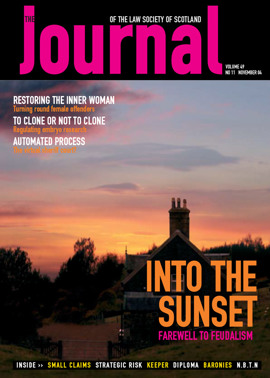Rediscovering hope

Each room is brightly decorated and comfortably furnished. Meetings and interviews take place almost in a setting of casual domesticity. In the “loud room”, CD players sit beside board games, crafts and manuals on yoga and exercise. As we tour, we apologise for wet footprints on a spotless newly-washed floor. But my hosts’ electronic pad is needed to open every door for us. “You’ve been observed 360 degrees and you’re not aware of it”, they tell me at the end. And the reception desk counter becomes a bullet-proof screen at the first sign of trouble.
This is 218, from the outside a Victorian building typical of Glasgow’s Bath Street, but on the inside an embodiment of the latest thinking in rescuing women at the margins of society from a life of addiction, crime and custody.
218 opened its doors in January, the successor to “Turnaround”, a service developed as a safe haven alternative to custody for women offenders who would benefit from time away from their regular environment but did not really need to be in prison. “218 provides the bit that Turnaround couldn’t do”, says Netta MacIver, Chief Executive of Turning Point Scotland whose tender won the funding to set up 218. “Before, looking at the analogy of a hospital, we were an A&E ward; now we can offer a full range of investigative processes and actually get the patient well at the end of it and not just patched up and on their way back out again.”
Treating the traumatised
At the heart of the 218 approach is “relational psychology”. This holds that mutual, empathic, creative connections with others are so crucial to a woman’s sense of self, and self-worth, that psychological problems can be traced to disconnections or violations within relationships. “We deal with trauma here, straightforward trauma,” explains Sophia Young, service manager at the centre. “Women who’ve been multiply traumatised from a very small age, never recovered and turned to drugs in order to sedate their feelings and their symptoms. So we’re talking about the root cause – serial abuse, multiple grief, tragedy, it’s of epic proportions but each woman we see has experienced several of these occasions; each one would have driven anyone to a period of deep depression but she’s had them one on top of the other.”
It was the report on suicides at Cornton Vale prison that first identified these issues, and led initially to the Turnaround service. Both my hosts insist that the great majority of women in prison are open to the treatment approach. “The prison population has a small number that would need to be kept locked up”, says MacIver. “But if you look at regular persistent offenders, female offenders tend to be imprisoned and for any of that group this type of service can be much more effective.”
Women from Glasgow can access the service from court, from prison, as part of an order or by themselves if they have been in custody in the last 12 months. Preferably they will have a Criminal Justice Service care manager. Each potential client undergoes a four-part assessment, into offending behaviour, drug use, psychological/mental health, and physical health. By the end a solid care plan is forming out of what’s wrong, what needs done, what’s been tried before and what the woman is ready for.
The 218 programme has three stages. Once assessed as suitable, women whose lives are in the greatest chaos go on the starter programme. Stabilising them is the first priority. “Women that far out on the margins need to be brought in one on one”, Sophia Young explains. “You need to build a relationship, paying attention to her, helping her wash herself, eat food, take care of herself, creating a basic good enough working relationship. And once you’ve done that, by the second programme she’s ready to mix with other people because she feels ready.”
At the second level, which some women can go straight into, the programme becomes more intense, with compulsory and optional sessions so that a patient can increase her commitment without feeling bad if she misses a class. By the end of that stage a woman should have ceased offending and come off drugs. Only when they feel ready for it do they undertake the final stage, “opening up all the boxes that were closed – the therapeutic interventions”, the end result of which is coming off substitute medication and settling into a legal lifestyle. Some have already set a date for their detox – one woman phoned in to say “I’m coming in on 27 December so I can start the new year clean.”
Financial gain, human capital
Although most of those undergoing programmes are day patients, there are strict rules. “We’re watching everything”, Sophia Young emphasises. “If someone goes to the toilet we’re counting, quietly, how long has she been in there. We have drug sniffer dogs coming to clear out the building regularly and the drug policy is assertively managed.” If someone uses drugs on the premises she will face the same consequences as she would outside. “We don’t try to subvert women from the consequences of their actions. In fact we encourage them to accept the consequences. But one of these will not be that she loses this service… She will have to face the consequences in the building as well as in court. How do other people on the programme feel, knowing you’ve brought drugs into the building? Her accountability to the community grows. And that’s what is radical about this.”
Not yet running at full capacity, 218 currently has 14 residential places and capacity for up to 60 day patients. It aims to accommodate up to 135 women a year and provide day care for 400. With an average daily female prison population of 277, the potential for savings is huge. “Of five women we got in the last group, two were worth half a million pounds of criminal justice funds spent on their imprisoment by themselves”, claims Young. “Now if I can get those two out of the criminal justice system, I’ve made my budget. And I’ve got 51 women on the programme.”
“Then you add the human capital to that”, Netta MacIver joins in. “She’s likely to be a mother, she’s likely to be a daughter, she’s likely to be potentially an earner, a taxpayer. Money is only one bit of it: you have to add in all the other societal impacts.”
Of 80 women who started the programme up to August, 51 have completed, a very high retention rate, according to MacIver. “It’s far exceeded my expectations. We knew what we wanted to offer but we didn’t know how. What Sophia and the team have done is to work hard at the how – involving women in that process.”
Evaluating all round
Openness is encouraged to the extent that staff are open to challenge by patients as well as vice versa. Young herself admits to having been reprimanded at the dinner table for choosing the wrong moment. “It was absolutely appropriate for her to challenge me. I had been very sharp with this woman at the table, and I wanted to deprocess it where everybody who was involved in it could see it. And to me that’s OK because she’s challenged by me every day on her attitudes.”
Their prize case study to date is “Elsie”: “She had been in 13 [drug] rehabs, lasted 13 weeks in each and left, gone back to prostitution, gone back to offending, she had a horrendous situation. She completed her stay here and is now studying psychology at university. Now that’s the fastest, biggest one, that’s going from beginning to end in nine months. She’s still on programme support. And that’s way beyond our aspirations. But it wasn’t beyond her aspirations.”
Naturally the service is being closely monitored, and evaluated. So what are the prospects for offering it more widely?
“If this proves to be a more effective way of working with the vulnerable groups that we’re talking about, why wouldn’t Scottish Prison Service rethink how it provides services? And either do it directly, or in partnership, but certainly there has to be a question asked about the number of new prisons we’re building. That continues to imprison more people but doesn’t reduce reoffending.”
Could the 218 approach even cross the gender divide? “We currently are working on a proposal to push the boundary and look at whether there’s a potential for doing a service for men. Not by 218!”
Shared goals
Meanwhile the two women are keen to leave no stone unturned to see that those whom 218 could help are given that chance. Workers liaise at court with fiscals to identify suitable cases for diversion, which they hope will extend in time to more complex cases. “The sheriff court’s working fantastically in terms of diversions, but we want more awareness from the district court in particular”, says Sophia Young.
At the disposal end of the court process they also want to collaborate. “What we ask the courts to do is tell us what goals they want us to achieve… We’ve got quite a few drug treatment and testing orders, deferred sentence, we take all of that, and the court just needs to set the reporting requirements.”
“I want to speak to the sheriffs, I want to be much more in contact with the front of the court and see them using 218 as a disposal much more creatively, more often, so that we’re getting referrals direct from the courts”, she asserts. “The right women are coming through the door, but they’re doing it themselves or an agency’s doing it for them; they’ve got court appearances and then we get a referral from the court. We’re making our own referrals by finding the women out there.”
To help raise awareness of what is still a fairly new service, a film is being made, targeted at the bench and defence agents. There is also a DVD, a leaflet, and even a DVD designed for potential clients so they can see what would happen to them. There is even an open invitation for interested parties to go and see the facility for themselves – every Friday at 9.30 am there are tours of the project.
“I think the message would be, to anyone who’s reading the article, if you’re seeing a woman regularly, and you know she doesn’t have to be reoffending if she was given the right support, call the assessment team. We’re there every day.”
“218” is at 218 Bath Street, Glasgow G1 4HW (tel 0141 332 6200 (assessments and referrals 0141 331 6216); fax 0141 331 6202; email info@218.org.uk; www.218.org.uk).
In this issue
- Drafting consumer contracts
- Virtual firms: transactional learning on the web
- Ignorantia juris: it's all Greek to me
- Sheriff Court Rules Council consultation paper
- The Clinical Trials Directive - a summary
- Guarding the inner sanctum
- Neighbours in the global village
- Family law: is it the path for you?
- From sunset to sunrise
- What next for conveyancing?
- An ethical minefield
- Shredding the evidence
- Robbing the poor?
- Our dynamic profession
- A wider angle
- Keep the eye on the ball
- A rough guide to becoming a partner
- Rediscovering hope
- Sharpen your pencils
- Significant other
- Too far or not enough?
- Chipping away the infringers?
- View from Holyrood
- Website reviews
- Book reviews
- The Registers and the Appointed Day
- Feudal law: not just a relic
- Birth of a register






